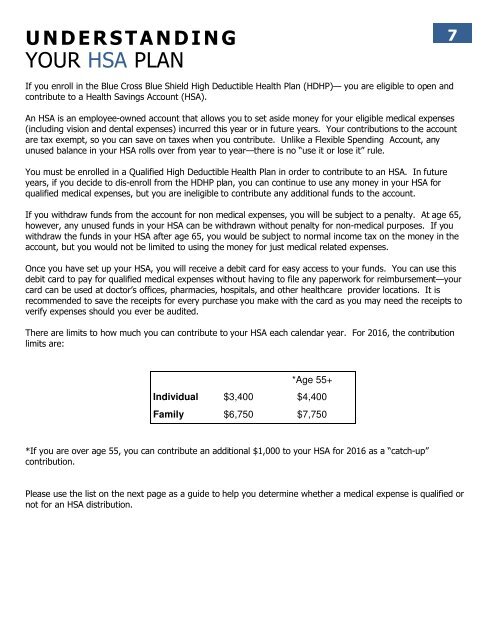GRG Full-time Management FINAL
Create successful ePaper yourself
Turn your PDF publications into a flip-book with our unique Google optimized e-Paper software.
U N D E R S T A N D I N G<br />
YOUR HSA PLAN<br />
7<br />
If you enroll in the Blue Cross Blue Shield High Deductible Health Plan (HDHP)— you are eligible to open and<br />
contribute to a Health Savings Account (HSA).<br />
An HSA is an employee-owned account that allows you to set aside money for your eligible medical expenses<br />
(including vision and dental expenses) incurred this year or in future years. Your contributions to the account<br />
are tax exempt, so you can save on taxes when you contribute. Unlike a Flexible Spending Account, any<br />
unused balance in your HSA rolls over from year to year—there is no “use it or lose it” rule.<br />
You must be enrolled in a Qualified High Deductible Health Plan in order to contribute to an HSA. In future<br />
years, if you decide to dis-enroll from the HDHP plan, you can continue to use any money in your HSA for<br />
qualified medical expenses, but you are ineligible to contribute any additional funds to the account.<br />
If you withdraw funds from the account for non medical expenses, you will be subject to a penalty. At age 65,<br />
however, any unused funds in your HSA can be withdrawn without penalty for non-medical purposes. If you<br />
withdraw the funds in your HSA after age 65, you would be subject to normal income tax on the money in the<br />
account, but you would not be limited to using the money for just medical related expenses.<br />
Once you have set up your HSA, you will receive a debit card for easy access to your funds. You can use this<br />
debit card to pay for qualified medical expenses without having to file any paperwork for reimbursement—your<br />
card can be used at doctor’s offices, pharmacies, hospitals, and other healthcare provider locations. It is<br />
recommended to save the receipts for every purchase you make with the card as you may need the receipts to<br />
verify expenses should you ever be audited.<br />
There are limits to how much you can contribute to your HSA each calendar year. For 2016, the contribution<br />
limits are:<br />
*Age 55+<br />
Individual $3,400 $4,400<br />
Family $6,750 $7,750<br />
*If you are over age 55, you can contribute an additional $1,000 to your HSA for 2016 as a “catch-up”<br />
contribution.<br />
Please use the list on the next page as a guide to help you determine whether a medical expense is qualified or<br />
not for an HSA distribution.


